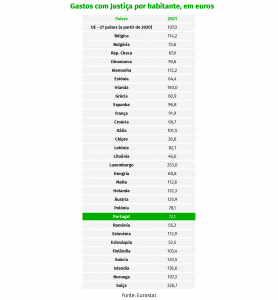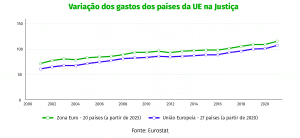On average, the euro area spends €107 per citizen on justice. At the top of the table is Luxembourg, which spends €273 per inhabitant.
Portugal is the seventh country in the Eurozone that invests the least in justice. According to Eurostat data released this month, public spending on courts per capita is currently 38%, lower than the Eurozone average. And in the last five years (from 2016 to 2021), our country was the one that least increased this investment, again below the Eurozone average (Portugal: 2.8% per year vs Eurozone: 3.1% per year).
For each Portuguese citizen, the state spends only €72 a year. On average, the eurozone spends €107 per citizen on justice. At the top of the table is Luxembourg, which spends €273 per inhabitant. Followed by Switzerland with an average of €226 per inhabitant. Below Portugal are only Czechia, Croatia, Estonia, Greece, Hungary; Romania, Slovakia, Lithuania and Cyprus.

“The fundamental right of access to justice has been devalued, as has the fundamental importance of access to the courts for the most deprived citizens. The most visible face of this devaluation is the inexplicable and unacceptable lack of a dignified update of the fee schedule for lawyers registered in the access to law system, which has not been properly revised for more than 18 years”, explains João Massano, president of the Regional Council of the Bar Association.
“The lack of investment is revealed in the lack of human resources, see, for example, what is happening with the bailiffs and their claims, and in the lack of investment in the material conditions of the courts, see, in particular, the budget for works in the courts”, says the lawyer. “It is also necessary to act on the other side of the coin and promote to the authorities the need to build a fair system of costs that does not drive citizens away from justice by economic means. In fact, passing on the entire cost of justice to the middle class, as is currently the case, through the payment of high court fees is, in reality, driving the citizen away from justice. This state of affairs feeds an endless vicious circle, referring the citizen to the legal advice of “doctor google””, he concluded.

Already in 2015, Portugal spent an average of €56 per citizen on justice alone , which placed us 17th among EU countries. Roughly in the middle of the table. According to the European Union Justice Scoreboard, at that time Spain spent an average of €90, Italy almost €100. In 2010, Portugal spent around €80, but in 2013 it was less than €50, a figure that rose to €56 in 2015. Data for a period just after a judicial reform made in 2014, by the PSD-CDS government.
Contacted by ECO, the Ministry of Justice did not respond in a timely manner as to the reason for these figures, now revealed by Eurostat.
Investment foreseen in the State Budget
The Justice Budget Program for 2023showed a total consolidated total revenue of €1701.2 million and a total consolidated expenditure of €1701.1 million, representing an increase of 19.9% compared to the estimated execution by the end of 2022.
The Recovery and Resilience Programme is funding €267 million for the digitalization of justice and criminal investigation and will be used to invest in digital platforms for courts, citizen and business documentation, criminal investigation and forensics, management, but also in technological infrastructure and equipment.
“The reforms and investments for 2023 include: The entry into force of the legal framework that creates a legal regime to encourage the extinction of the instance by judicial and extrajudicial agreement; the presentation of measures in the context of the reform of the administrative and tax jurisdiction, through measures of a managerial and organizational nature, procedural simplification and increased use of new technologies; the modernization of the criminal investigation support system, including the implementation of new Interfaces of the interception systems, also ensuring interoperability with European and international counterparts “, reads the report.
According to the State Budget report, of the total consolidated revenue, 53.5% is represented by own revenues, with the remaining funding coming from tax revenues allocated to the Program (38.8%) and European funds (7.7%).
“In the Program’s revenue, Fees, Fines and Other Penalties (835.8 million euros) stand out, with special emphasis on the collection of various emoluments in the scope of registries and notaries, in charge of IRN, with 410.9 million euros and for the collection of justice fees and emoluments collected by IGFEJ, with 390.5 million euros “, adds the report.
On the expenditure side, 64.2% of total consolidated expenditure is for personnel costs, which represents a total of “€1,091.5 million in appropriations”.
“Also noteworthy are appropriations for the acquisition of goods and services, with 439.2 million euros, highlighting the IGFEJ [Institute of Financial Management and Equipment of Justice], with 202.1 million euros, the Directorate-General for Reintegration and Prison Services (DGRSP), with 65.7 million euros, and the IRN [Institute of Registries and Notaries], with 62.9 million euros, intended to finance the current activity of these entities “, adds the document.

